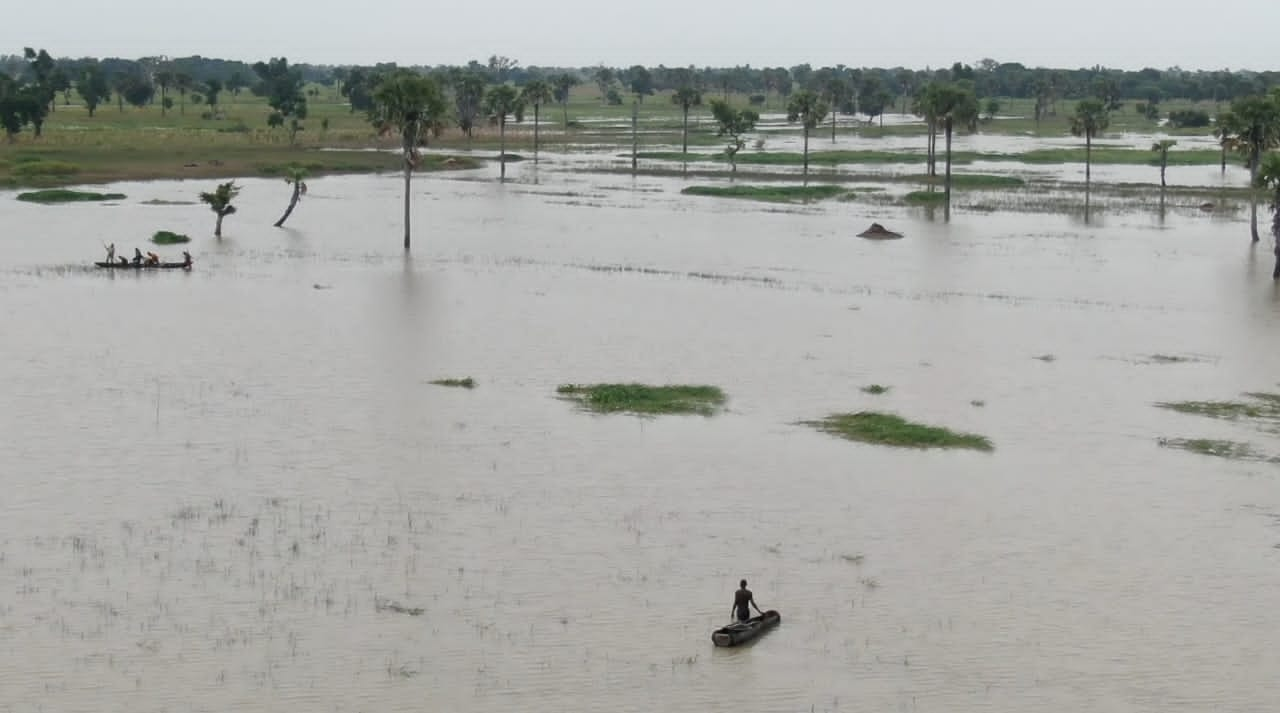5 ways to curb flooding in Nigeria – Council
The Environmental Health Council of Nigeria (EHCON) has offered a solution to the perennial flooding in Nigeria which has often killed many and wrecked property worth trillions of naira over the past decade. Last year, flooding in 33 of Nigeria’s 36 states affected over two million people, killing over 600 people while about 2,400 others […]

FILE PHOTO: Flooded rice paddy in Taraba
The Environmental Health Council of Nigeria (EHCON) has offered a solution to the perennial flooding in Nigeria which has often killed many and wrecked property worth trillions of naira over the past decade.
Last year, flooding in 33 of Nigeria’s 36 states affected over two million people, killing over 600 people while about 2,400 others were injured.
Registrar of EHCON, Dr Yabubu Mohammed, in an interview with Daily Trust, said flooding is a natural disaster but it is most often exacerbated by human activities.
He said the council has come up with five ways of curbing the menace of the flooding since the Nigeria Meteorological Agency (NiMET) issued a grim forecast for 2023 which will witness an early onset of rainfall accompanied by flooding.
Flooding: Ex-Malawi president to study FEMA
Flawless Djokovic crushes Norrie to reach Rome quarterfinals
Software to evaluate waste
Mohammed said the application of the software, which he described as a scientific device to evaluate waste generated by every household and ensure an accurate billing system, would reduce flooding in the country.
He said much of the flooding experienced in cities and towns is caused by indiscriminate disposal of waste in water channels.
He described the measure as one of the council’s measures to address flooding in Nigeria, adding that the software would as well put a stop to the outrageous billing system by the Abuja Environmental Protection Board (AEPB) when deployed in Abuja.
Mohammed explained that the software which would be piloted in Abuja would take inventory of the volume of waste each person in a household produces on a daily basis and would be transparent in determining charges for the volume of waste, in accordance with global best practices.
“The essence of the software is to take an inventory of the number of persons in a household which can be done at the comfort of your room.
“We design a questionnaire that will require every household to fill; if you are five in number, you indicate and if you are relocating, it will be possible for you to log into the system and also indicate.
“l believe Nigerians as responsible citizens will pay for what they have generated,’’ he said.
Activate emergency response system
Mohammed also said the council, working in collaboration with other stakeholders, will activate its emergency response system to ensure that waste dumped in drainage and waterways are evacuated and disposed of properly.
He said apart from being the primary cause of floods in urban centres, waste dumped in drainage also causes environmental pollution.
Sustainable waste management
The registrar further said as part of efforts to reduce the negative impact of waste on the Nigerian environment, the EHCON is synergising with states and local governments to adopt sustainable ways of managing waste so that they will not end up in gutters and storm drainage.
He said if waste could be managed sustainably, it could contribute to the circular economy and become a source of employment and wealth creation for many Nigerians.
He said waste recycling was profitable and it would enhance Nigeria’s green growth, creating about 10, 000 jobs and ensure sustainability in the proper management of the tonnes of waste that Nigerians generate which often end up in waterways.
He said the council would sensitise Nigerians on the value of waste and how to segregate it at source so that collectors could pick them up easily.
Enforcement at local level
The EHCON boss also said it was important to enforce proper waste evacuation and disposal at the local levels. He strongly advised that local government areas and metropolitan councils deploy environmental health officers to carry out the enforcement task.
“It has become necessary for the local government areas and metropolitan councils to deploy environmental health officers to strategic positions to stop recalcitrant residents from dumping waste in drainage. Those who do that can be arrested and fined to serve as a deterrent to others who think they can dispose of their waste just anywhere,” he said.
Reinstate environmental health officers at development control
Mohammed, who reiterated that flooding in urban areas is caused mostly by human activities, stressed the need to reinstate environmental health officers at the development control departments of all states of the federation including the Federal Capital Territory (FCT) as a measure to incorporate public health considerations into town planning and granting of building approvals.
He said in the past, such officers were stationed in the development control departments and would always have inputs into town planning and building designs, with a view to ensuring that approvals were not given for buildings on flood plains and sanitary lines were clearly mapped out in the plans.
He explained that it is the environmental health officers that are the only trained professionals with the requisite knowledge to uphold such basic but important development control and planning principles but lamented that they have been sidelined over the years.
Mohammed added that the council had held stakeholders engagements ahead of deploying the measures, saying the stakeholders include directors of environmental health in area councils, satellite town development agencies, and sewage the director in the Ministry of Environment.
